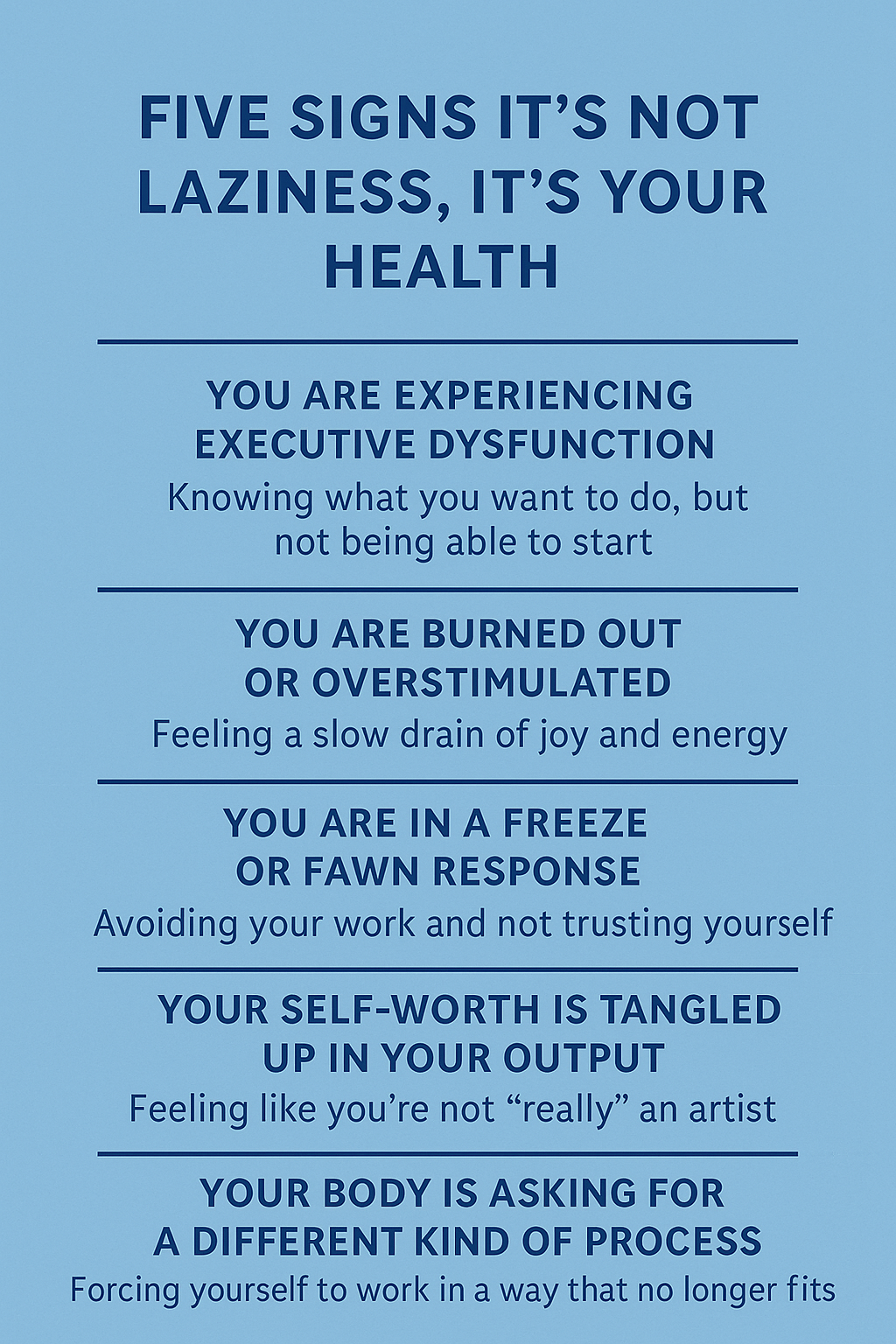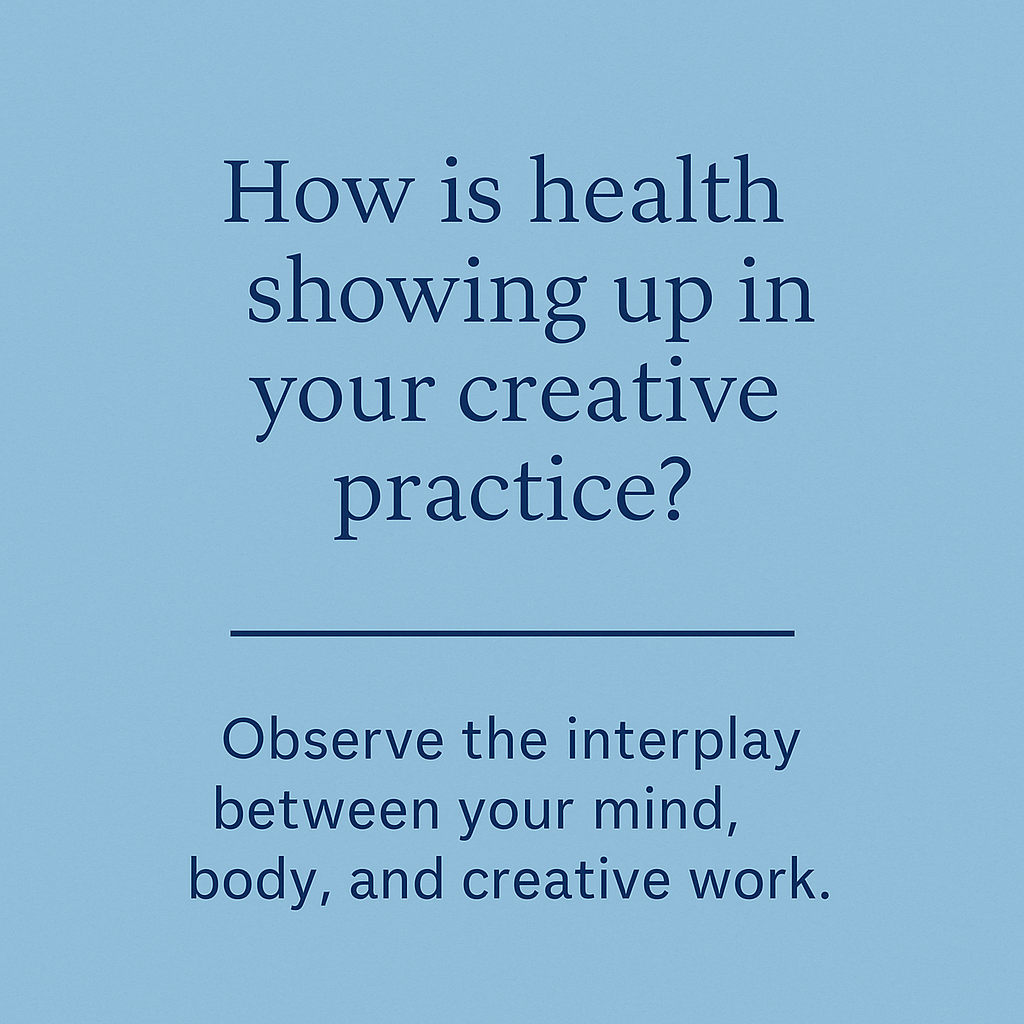Understanding the real reasons artists, writers, and makers struggle to create, and how to support them
If you’re a creative professional or someone who supports creatives, you’ve likely heard this before:
“I just can’t seem to get started.”
“I know what I want to make, but I’m not doing it.”
“I feel like I’m lazy, but I know that’s not really true.”
When a creative person stops making, it’s easy to assume the problem is motivation or discipline. But in my work with artists, writers, and makers, I’ve seen a different story emerge. Often, the perceived laziness is actually a symptom of something deeper.
Whether you are experiencing these struggles yourself or work with creatives in a therapeutic, coaching, or teaching role, this post outlines how mental and physical health challenges disrupt the creative process. It also offers a more compassionate and effective way to respond.
When “Laziness” Is Really Something Else
In my private sessions, I work with creatives navigating anxiety, depression, ADHD, chronic illness, trauma, burnout, or neurodivergence. They are sensitive, thoughtful, and often deeply committed to their work. Yet they find themselves blocked, inconsistent, overwhelmed, or disconnected from the creative identity they once held closely.
This is not about resistance for the sake of resistance. It is about:
-
Executive dysfunction that makes task initiation feel impossible
-
Sensory overload that prevents sustained focus
-
Burnout or nervous system exhaustion that drains emotional capacity
-
Internalized shame from not being “productive enough”
-
Unrealistic expectations about how creativity is supposed to look
These are not character flaws. They are common experiences for people living with mental health or chronic physical conditions. Yet because creative culture often glorifies constant output, these artists tend to feel like they are falling short.

What Creative Support Should Actually Look Like
Support for blocked or inconsistent creatives must acknowledge the realities of health and nervous system regulation. In my one-on-one sessions, I take a flexible, integrative approach grounded in psychology and expressive arts. This often includes the following:
1. Reframing the Narrative
Many clients hold the belief that inconsistency means failure. Together, we examine where that story originated and begin to replace it with a more humane and sustainable perspective. Motivation becomes less about pressure and more about alignment.
2. Identifying Hidden Patterns
Avoidance, perfectionism, and shutdown often stem from protective patterns. These patterns may have helped in the past but now stand in the way of creative engagement. By identifying them with curiosity, we can develop strategies that are supportive instead of punishing.
3. Exploring Adaptive Practices
Sometimes the usual creative tools or routines no longer match a person’s current capacity. I help clients experiment with new formats, flexible timelines, or sensory-based approaches that support their emotional and physical needs.
4. Validating Cyclical Rhythms
Creative timelines are rarely linear, especially when health is part of the equation. In session, we create realistic plans that account for energy fluctuations and emotional labor. This gives clients permission to pause without losing momentum or self-trust.
Who These Sessions Are For
My 1:1 Creativity and Wellness Sessions are designed for:
-
Creatives who feel blocked, inconsistent, or ashamed of not producing
-
Artists navigating illness, burnout, or neurodivergence
-
Writers experiencing emotional or sensory overwhelm
-
Therapists, coaches, and facilitators seeking support for creative clients
-
Anyone looking to rebuild their creative identity with clarity and care
Sessions are personalized and collaborative. I draw on my Master’s degree in Psychology, my lived experience managing a chronic mental health condition, and extensive training in narrative therapy, expressive arts, and somatic awareness.
You Don’t Have to Push Through Alone
If you are feeling disconnected from your creative work, or you are trying to support someone who is, I want to offer a new possibility. What looks like laziness may actually be a misinterpreted survival response. What seems like inconsistency may be the nervous system asking for rest, ritual, or redirection.
There is a way to reconnect with creativity that honors the truth of your experience. You do not have to meet impossible standards. You do not have to do this alone.

Leave a Reply